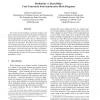Free Online Productivity Tools
i2Speak
i2Symbol
i2OCR
iTex2Img
iWeb2Print
iWeb2Shot
i2Type
iPdf2Split
iPdf2Merge
i2Bopomofo
i2Arabic
i2Style
i2Image
i2PDF
iLatex2Rtf
Sci2ools
DATE
2008
IEEE
2008
IEEE
Modularity vs. Reusability: Code Generation from Synchronous Block Diagrams
We present several methods to generate modular code from synchronous hierarchical block diagrams. Modularity means code is generated for a given macro (i.e., composite) block independently from context, that is, without knowing where this block is to be used, and also with minimal knowledge about its sub-blocks. We achieve this by generating a set of interface functions for each block and a set of dependencies between these functions that is exported along with the interface. The main trade-off is the degree of modularity (number of interface functions) vs. reusability (the set of diagrams that the block can be used in without creating dependency cycles).
DATE 2008 | Hardware | Interface Functions | Modularity Means Code | Synchronous Hierarchical Block |
Related Content
| Added | 29 May 2010 |
| Updated | 29 May 2010 |
| Type | Conference |
| Year | 2008 |
| Where | DATE |
| Authors | Roberto Lublinerman, Stavros Tripakis |
Comments (0)

